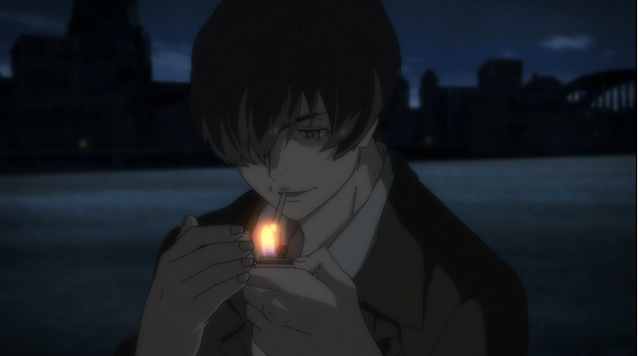Anime Weeklies: Summer Week Four
 |
| If Batman were a psychotic murderer... |
This third episode focuses on the missing body of Serpente--which ended up in the hands of a corrupt Federal agent Scuso, who immediately takes it to the head of the Vanettis and offers them a chance to pay for it disappearing so they aren’t tossed into war with the Orcos and/or risk pissing off the Galassias. Meanwhile, Bruno manages to talk his way out of his own death when Nero Vanetti orders him to find Serpente’s body, as proof that he isn’t secretly helping the Orco family. Speaking of, we’re finally introduced to Don Orco, head of the Orcos.
91 Days is utterly unafraid to introduce utterly unsympathetic characters--Don Orco is a bastard who literally has someone killed because his lasagna isn’t completely perfect. His head enforcer Fango is so deep into BDSM last episode he was having a woman beat him bloody while this episode he nearly burns a guy’s eye out and was clearly getting off on it. Even the series’ “main” character Bruno Avillio is completely heartless. This isn’t the story of the rise of a Batman-esque hero: he’s a guy who has a singular main goal: kill the people who took his family from him, and he doesn’t seem to have any qualms about how it happens or who he has to go through to get it done. It’s only the third episode, he’s just barely dodged being killed by the Vanettis, and yet when Nero has to leave town as a result of what’s happened with Serpente, Bruno immediately decides to go with him to have a shot at ending Nero as well. He doesn’t even seem to have any regrets as he watches Nero at Vanno’s funeral, clearly torn apart over the loss of his best friend. Look at the image above--that’s the face of a remorseless monster.
Having said that, it’s my hope that the series only has Bruno kill three people: Vanno, Nero, and the head of the Vanetti family. And even though I give it two episodes before they ruin that, that’s the sort of perfect poetry that would give this series a perfect ten in my eyes.
In any case, my thoughts in the first episode remain semi-accurate--as new factions arrive and they take steps to introduce more visual flair to make each character stand out, I can’t help thinking a bit of extra variety to the colors to make things more “anime-esque” would’ve done wonders (especially in helping some viewers tell characters apart), but then that might take away from the stark realism of this show. I haven’t been this into a “non-anime” anime since Shingeki no Bahamut.
 |
| ...I feel as if this wouldn't be information you'd share with the troops. |
Granted, most of their problems are because of their earlier accomplishments with the notable exception of our main character, once again: when they’re all given platoons to lead, he discovers his second-in-command is the daughter of a woman who’s marriage he may or may not have “ruined”. In addition to easily being the funniest scene in the episode, I’m kind of glad Ikuta’s actually living up to his role as a “ladies’ man”. All too frequently characters will claim the job only to end up being rebuffed by every woman they approach, which usually makes me question not only the author for giving them that title but find the character to be more of a joke.
In any case, it’s unfortunate that just as the episode’s getting good it comes to a stop: the entire episode, Ikuta and the others have been dealing with a group of upperclassmen bullying them. There’s even a point where the confrontation gets physical and in the first time across three episodes Yatori makes herself useful for more than beating up the main character for stating truthfacts by taking on all the bullies solo. But then the team get their first big assignment as members of the prestigious officer’s school: a mock battle pitting them versus their upperclassmen. It’s the kind of thing where you expect to finally get a real sense of Ikuta’s battle genius, but the episode ends before we can get to it. But it does leave me excited for the next episode, and so far from this show that’s all I can ask for.
 |
| If you guessed that these words were spoken by someone living in utter, decadent luxury...you were correct! |
Before they can even make it to Gilan, the group is attacked in the middle of the desert by a group of thieves with some rather familiar markings on their faces. When it's revealed that they're members of the Zot Clan that Alfreed was once apart of, things go from tense to friendly, with the bandits even promising their help to Alfreed and Arslan if they ever need it. This will doubtlessly become important later, as things are pointing towards Arslan not being king over just Pars, but being a leader who can unite multiple groups of people under one banner. At the same time, mention is made of Alfreed's brother, the rightful leader of the Zot Clan...who's now indebted to Hermes. Uh-oh.
In the meantime, while the trip to Gilan starts out cutely enough (the team gets to go shopping!), things turn far more serious when the group strategist Narsus meets up with his old friend Shagad, a fellow scholar now turned merchant. One of the major discussion points for Arslan season one was seeing the prince get to a point where he realized that slavery was wrong, and abolishing slavery throughout the lands of Pars. It took some careful speeches made by Narsus (plus the whole "the slaves took the crown city from you" thing), but ultimately he realized that for Pars to continue as a nation they had to accept that all men were born free, and should remain that way.
What's fascinating here is that in Gilan, a city that is overflowing with wealth, the point is made that society cannot be as prosperous without slaves as it is with them. It feels like a discussion that's largely history-based and not terribly relevant to today, but in reality Arslan was probably the most relevant episode I watched this week. "Slavery" in the strictest sense may no longer exist, but Gilan was an example of a society that allowed the few to profit off the backs (literally, in this case) of the many, and the many are often far less fortunate. Narsus' friend swore that Gilan was only as successful as it was due to slavery, but was ignoring how he basically was living in the lap of the most excessive luxury. It's the ninety-nine versus the one percent: sure the rich could totally be a little less rich so the poor could be less poor, but then how could they enjoy the proper level of decadence they're shooting for?
Anyway. That was probably totally unintentional, especially since Arslan's source material is decades old, but that bit of relevance was still welcome.
 |
| Well, no wonder you can't pull the sword out. You can't even tell this girl to wake up, 'cause she's sleeping in front of everyone. |
The bulk of the story for this episode is focused on the Sacred Sword Festival, which leaves most of the inhabitants of Ladylake disgruntled after no one is able to pull the sword and Alisha announces that she's refusing to declare war on any of their neighboring nations. The resulting negative sentiments gathered together in such a small area raises a powerful monster, and...that's about where I end up having a problem with this ep.
See, much like the seraphs, no one can actually SEE the monsters in question. So it just looks like the church is randomly falling apart and no one's smart enough to escape. It's undoubtedly a question of pacing, as I should be so focused on Sorey and his attempt to finally pull the sword out and attain the approval of the Lailah the Lady of the Lake, but they spend so much time showing the "idiot villagers". Fortunately, the result of this is that Sorey's initial merging with Lailah isn't dragged out and his first fight as the Shepherd is finished strongly enough that he looked impressive. Making sure the main character looks more powerful after a power-up/resolve-strengthening flashback/whatever is a small thing, but it's the little things that count.
Having said that, I'm kind of back to my initial problem with this series: it's taken us four episodes just to properly get out the gate. The whole bit with Sorey becoming a Shepherd and learning to fuse with Seraphs is basically the start of the journey, which leaves us only nine for the rest of the story. Here's hoping for a second cour.
Active Raid 3: Dueling Sentai teams, go! ...At least, that was the plot I expected when they reintroduced series overachiever Kazari Asami and her frequently-hinted Unit 9, protectors of West Japan. She gives an entire speech about how great they are, how they're all "elites" and that they're actually better than Unit 8, so I was expecting something along the lines of Power Rangers' SPD's "A-Team" or Power Rangers Lightspeed Rescue's Cyborg Rangers--where the show tells a story about how being "elite" doesn't necessarily mean being the best.
The show actually takes a hard right on that trope: Unit 9 is ironically worse at things than Unit 8, mostly because Kazari is a horribly ineffective leader. After a training session ends in disaster, she outright says that the team doesn't need to build up teamwork but should instead merely focus on giving her support. This becomes an issue when later in the episode Unit 9 is called into East Japan in order to help the flu-stricken Unit 8 with a case. Kazari's team suffers a hilarious string of failures that we would've never seen from Unit 8, as they try to stop a group of Willwear-using otaku that have holed themselves up in a building because of complex seiyuu politics. (Which end up being a misunderstanding in the first place.) Have I said how much I love this show? It manages to be so unquestionably anime without employing most of what drives me nuts about anime.
The episode ends with Kazari's Unit 9 being brought in on a secret case, which is actually kinda concerning. We're three episodes into what's only a twelve episode show, and whatever the criminal element is this time they haven't made any solid moves yet. I'll reserve judgment for another couple weeks but by episode five if nothing significant has happened we may be in for a bit of a rushed ending.



Comments
Post a Comment